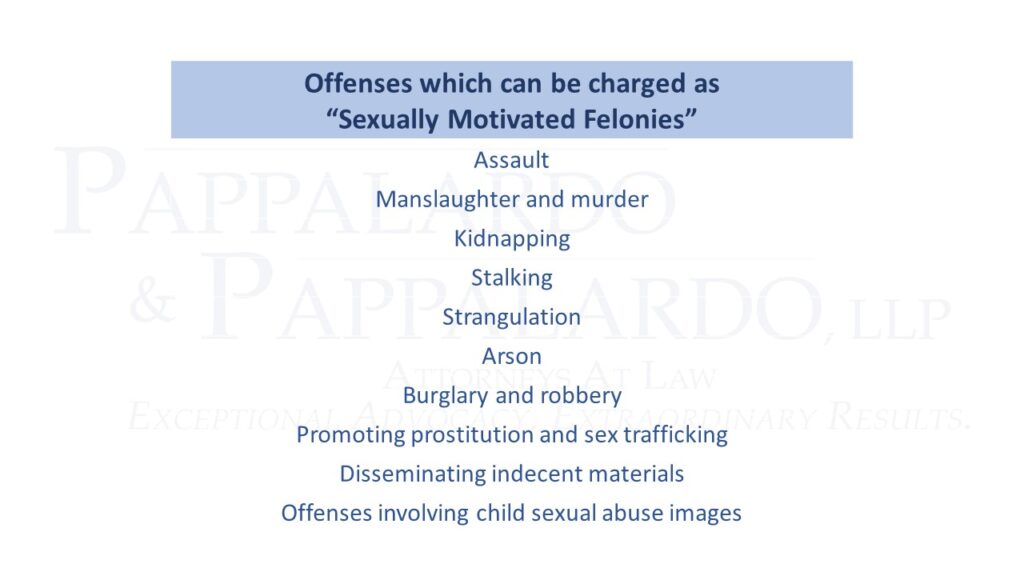Sexually Motivated Felony Charges in NY
When a crime has been committed but is not a sex offense, there may have been a sexual motivation. In New York, such can be charged as a “sexually motivated felony.” When this happens, the consequences of a conviction become more severe.
What Is a Sexually Motivated Felony?
Under New York law, a sexually motivated felony is an offense committed for the purpose of the actor’s sexual gratification. Specifically, it includes not only completed crimes, but also attempts or conspiracies to commit those offenses.
In the statute (Penal Law § 130.91), the list of sexually motivated felonies includes:
If charged as a sexually motivated crime, the underlying felony will become a “violent felony offense.” For any violent felony offense, the possible sentence will be enhanced. Additionally, many of these offenses will also trigger registration as sex offender.
New York’s Sex Offender Registration Act (SORA)
When a person is convicted of certain offenses in New York, they will also have to register as a sex offender. At the time of their sentencing or when they’re released from prison, there will be a hearing to determine the appropriate level of registration. According to the law, this level is meant to represent the person’s risk of re-offense and dangerousness so that the community can be notified accordingly. Additionally, the judge must make a determination whether the individual should be designated a “sexually violent offender,” “predicate sex offender,” or “sexual predator.”
In New York, the list of offenses which trigger registration are set forth in Correction Law § 168-a. Specifically, this list includes:
Does a Sexually Motivated Felony Require Sex Offender Registration?
Recently, the Appellate Division First, Department addressed registration for those convicted of sexually motivated felonies. In People v. Simmons, the defendant had been convicted of assault in the first degree as a sexually motivated felony. Notably, assault in the first degree is not a registrable offense, but he was told by the judge he had to register as a sex offender because it was a “sexually motivated felony.” On appeal, he argued that this was not a registerable sex offense under SORA.
On appeal, the appellate court agreed with the defendant. In its decision, the court held that the plain text of the registration statute was clear. Significantly, the court held, “Based on the clear and unambiguous text of [the sex offense registration statute], we find that the only sexually motivated felony offenses that are included in the definition of ‘sex offense,’ and therefore registerable under SORA, are those based on offenses listed in [the sex offense registration statute].”
References:
- Penal Law 130.91, “Sexually motivated felony.” Available at: https://www.nysenate.gov/legislation/laws/PEN/130.91 (last accessed Jan. 24, 2022).
- Correction Law 168-a, “Sex Offender Registration Act: Definitions.” Available at: https://www.nysenate.gov/legislation/laws/COR/168-A (last accessed Jan. 24, 2022).
- People v. Simmons, 2022 N.Y. Slip Op. 00284 (1st Dept. 2022). Available at: https://nycourts.gov/reporter/3dseries/2022/2022_00284.htm (last accessed Jan. 24, 2022).
Image: copyright 2022 Pappalardo & Pappalardo, LLP. All rights reserved.



